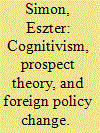| Srl | Item |
| 1 |
ID:
146209


|
|
|
|
|
| Summary/Abstract |
This article investigates the cognitive limitations on policy change in counterinsurgency (COIN) efforts by examining why American decision-makers failed to revise their government strategy substantially while fighting the insurgency in Afghanistan in 2003–2014 and why their British counterparts were more successful in adjusting their policies in the Malayan insurgency in 1948–1954. Unlike most of the COIN literature that concentrates on military strategy and tactics, the analysis of government policy-making in Malaya holds some important political lessons for American leaders today despite differences between the insurgencies in Afghanistan and British Malaya. As a response to the criticism of COIN studies in general that they lack theoretical guidance, this article utilizes an integrated cognitivist-prospect theory framework. It is argued that some of the COIN literature mistakenly suggests that a more difficult strategic situation was primarily responsible for American failure in Afghanistan. Instead, American decision-makers faced a more difficult task cognitively than their British counterparts, as policy change in Afghanistan would have required greater ideational change. American principals were much more attached to their beliefs emotionally, had no alternative problem representation, and had to shift between frames in order to engineer a response that was more in line with events on the ground in Afghanistan. Regarding prospect theory, findings indicate that gains frames appear to be unhelpful in monitoring progress until catastrophic failure endangers the reference point, and that decision-makers often have more than one reference point to attune their policies to, which often results in suboptimal choices with regard to at least one reference point.
|
|
|
|
|
|
|
|
|
|
|
|
|
|
|
|
| 2 |
ID:
164669


|
|
|
|
|
| Summary/Abstract |
Why do small states sometimes defy the behavioral expectations of powerful allies? Realism would suggest that they would not only ally themselves with more powerful states to ensure their security but would maintain that security through an accommodative strategy toward their protector once an alliance had been formed. Yet, this does not always happen; and the present article, building on Harnisch's (2014) pioneering effort to integrate role theory and the two-level game metaphor, investigates why. It offers and tests the hypothesis that, when small states prioritize their domestic role conceptions in formulating their foreign policy, they defy the behavioral expectations of more powerful allies. The 2014 visa revocation crisis between Hungary and the United States is used to illustrate this process: and contrary to what the literature suggests, the finding is that ego-dominated role-taking in international relations remains possible today even for small states.
|
|
|
|
|
|
|
|
|
|
|
|
|
|
|
|